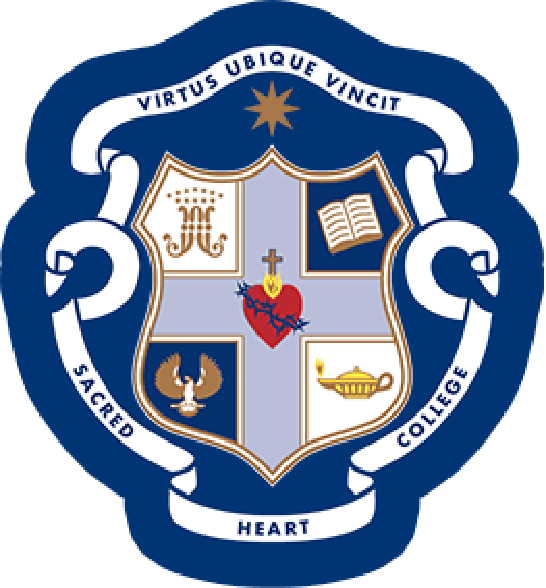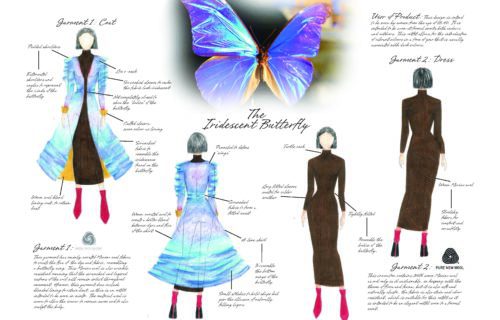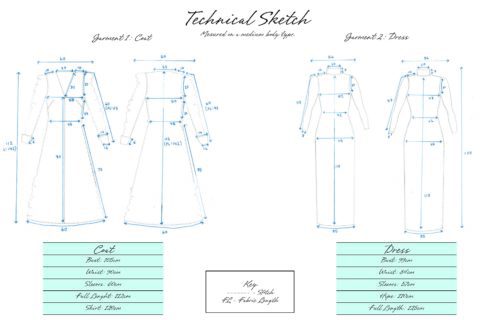
To our Sacred Heart Community
Congratulations – Lilli Orsillo
Earlier this year Lilli Orsillo was chosen as a state finalist in the senior category of the National Wool4School competition. Her design was inspired by Nature and is a great example of the creative process from inspiration and ideation to finished design.
Students at Work
How much does a cow weigh?
Year 11 boarders, Alphie Taylor and Nick Thompson kindly agreed to let us try our beginning level video making skills whilst showing a day in the life of the students doing Certificate 11 in Agriculture.
They attend Urrbrae College one day a week through the SHC VET program. The boys briefly speak about the course and what they hope to do into the future then show off their cattle handling prowess and the practical spaces available to the students. Daniel Barrett also features in the video but preferred to have a non-speaking role.
Key Dates
-
ACN Aged Care Scholarships – Undergraduate
Value: Up to $20,000
Open/Closing Dates: September 7th – November 8th, 2020
ACN is proud to support Australia’s aged care workforce by administering undergraduate aged care scholarships on behalf of the Australian Government Department of Health.
If you are passionate about aged care and have been thinking of commencing or progressing your career in this area, this is the perfect opportunity for you.
You can pursue your career goals through a scholarship for a Certificate IV in Aged Care, Diploma of Nursing or Advanced Diploma of Nursing.
To be eligible for a scholarship applicants must meet the following criteria:
- Australian Citizen or permanent resident of Australia
- Undertaking a course, which commences or is continuing in semester 1 2021 in the following:
- Certificate IV in Aged Care
- Diploma of Nursing
- Advanced Diploma of Nursing
Courses must be provided by an Australian registered training organisation or university.
-
Charlie Bell Scholarships – for those students working at McDonald’s
Value: Up to $30,000
Open/Closing Dates: September 14th – November 6th, 2020
In recognition of the contribution made by the former McDonald’s Corporation CEO, Charlie Bell, a scholarship for future leaders has been created in his name recognising Charlie’s commitment towards the provision of ongoing learning and education.
To be eligible to apply for the Scholarship, applicants must:
- Gain acceptance to or be enrolled in, an undergraduate or postgraduate degree at an Australian University;
- Be available to commence university or continue university, as the case may be, in Semester 1, 2021;
- Be an Australian citizen or permanent resident;
- In respect of one of the awards, an applicant must be employed by McDonald’s or its franchisees; and
- Not have been a previous award recipient of the Charlie Bell Scholarship for Future Leaders
- If an applicant is aged under 18 years, parental consent is required to validate the Scholarship application.
-
UniSA Rural Reconnect Relocation Scholarship
Value: $6,000
Open/Closing Dates: October 16th, 2020 – January 29th, 2021
These scholarships will assist students from rural and isolated areas to fund their relocation costs associated with moving to the city in order to pursue full-time undergraduate study.
Recipients must be Australian citizens or permanent residents and have completed Year 12 within the last two and a half years. Assessment is made on the basis of financial disadvantage, academic merit, a personal written statement, and a character reference.
-
TAFE SA Fashion Course Information Session
Thursday 12th November 2020, 5:50 pm – 7:00 pm
TAFE SA, Adelaide Campus
Choosing which TAFE SA course is right for you can seem like a big decision. To help you make the right study choices for the career you want, TAFE SA holds free course information sessions. Their information sessions are generally held around the application period.
Attending an information session allows you to meet with the teaching staff, learn more about a course and where it can lead you, discuss study options, find out about the application process and ask course-related questions. Information sessions are held on location, so it’s also a great chance to check out TAFE SA’s outstanding training facilities.
Tertiary Updates
-
Year 11 Results Pathway to Adelaide University for 2022
Recently we received notification from Adelaide University that they will extend the alternative Year 11 Results entry pathway introduced this year.
This pathway offers eligible Year 12 students a provisional early offer to various Adelaide University undergraduate degrees based on their Year 11 results.
The best 4 grades will be used and results must be in the A and or B band. There are some degrees which are excluded from this pathway.
-
Campion College
Campion College is a private Catholic institution based in Western Sydney and fully accredited through the Tertiary Education Quality and Standards Agency (TEQSA).
They offer a three year Bachelor of Arts in the Liberal Arts and a one year Diploma of Liberal Arts. A liberal arts education aims to produce graduates who are articulate, virtuous and knowledgeable across a range of fields.
As such, their courses focus on an integrated curriculum in history, literature, philosophy, theology and science, with optional units in Mathematics, Latin and Classical Greek.
Brochures available outside the careers office.
Training and Work
Work in Agriculture
Agri Labour Australia are looking for workers to register their interest in a variety of roles to help with upcoming harvests around the country. You could work with grain, cotton, mangoes, tomatoes, or blueberries. They need people in all sorts of roles, including drivers, maintenance workers, pickers, and more. If you’re hard working, fit, and looking for a challenge, there could be an ideal job waiting for you. Find out more here.
Your Human Right to Work
Did you know that access to work is one of your basic human rights in Australia? The Australian Government is a party to seven international human rights treaties, and one of them covers your right to work. This means that everyone in Australia has the opportunity to earn a living through any kind of work they freely choose. They are also not allowed to be deprived of work unfairly or discriminated against. So, as long as you are of legal working age (which can vary from state to state), there is nothing stopping you from going out and looking for work. Even if you are still a student at high school or university, you are allowed to work. However, keep in mind that this doesn’t mean you are guaranteed to be employed. These things are still affected by factors such as job availability and whether or not you are qualified. But there’s nothing out there to stop you from applying for and accepting any job you want.
-
Favourable Working Conditions
You also have a right to just and favourable conditions at work, including:
- fair wages, with equal pay for equal work
- safe and healthy working conditions
- equal opportunity for promotions
- rest, leisure time, holidays, and reasonable working hours
It’s important to keep these things in mind when you start working for the first time. And if you feel like something is wrong, you don’t have to stay quiet because you are young or inexperienced – there are ways you can take action if you believe you are being treated unfairly at work.
-
Discrimination
These human rights treaties also cover issues around discrimination in the workforce. You are entitled to help or compensation if you are refused a job, fired, made to work in unfair conditions, or are harassed because of your:
- sex
- disability
- race
- age (young or old)
- sexual preference
- religion
- criminal record
- trade union activity
- political opinion
It is against the law for an employer to discriminate against you for any of the above reasons. If you find that you have been refused a job or fired for these reasons, remember that is absolutely not ok.
Note that while workplace bullying is different from discrimination, there are still laws out there to protect you from bullying as well.
-
Where Can I Get Help?
The Australian Government is responsible for making sure your rights are met and respected at work. They have passed laws and rules that enforce your rights at work, and have set up several different bodies to assist you with different issues.
The Fair Work Ombudsman is a government body that can help you with advice on things like pay, leave, work hours, entitlements, and plenty of other work and employment-related issues.
Safe Work Australia is another government body that creates policy and provides advice on issues such as workplace safety and accident and injury compensation. Each State and Territory also has their own workplace health and safety regulator, who can do things like provide licences and registrations, and investigate workplace accidents.
The Australian Human Rights Commission is an independent body that can investigate complaints and provide advice on discrimination and harassment in the workplace.
Spotlight on Careers
-
A Design Job at the Museum of Ice Cream
Are you wondering where a career in design could take you?
Get inspired by USC (University of the Sunshine Coast) graduate Lilli Collingwood’s journey from uni student to designer at the Museum of Ice Cream in New York. At just 22 years old, she is the company’s lead graphic designer in the museum’s marketing team.
You can read her story here
-
Ask an Engineer
Power of Engineering is giving students in Years 7-12 the chance to ask engineers a question about their careers.
They have a network of amazing engineers in fields such as aerospace, mechanical, mechatronics and civil engineering who are ready to answer any questions you might have.
Diversity in the engineering profession? Skills required? The role that engineering fulfils in the community? If you’ve ever had questions about what a career as an engineer might look like, this is your chance to ask.
Power of Engineering will release a video of the engineers answering your questions.
Ask your questions here
-
How to become a Veterinary Nurse
What do Vet Nurses do?
Vet Nurses support Veterinarians by providing medical care to any animals that come into the clinic. The job involves undertaking a range of diagnostic tests, medical treatments and even some minor surgical procedures (under veterinary instruction), as well as educating and supporting owners on maintaining the health of their pets.
If you are caring and resilient, love animals but like people just as much, don’t mind getting your hands dirty and are prepared to be flexible, becoming a Vet Nurse could be a rewarding career to consider.
About you
- Passionate about caring for animals and their welfare but resilient enough to deal with the hard parts of the job
- A multi-tasking ninja who can work efficiently even under pressure
- A natural team player with great initiative
- Great communicator with excellent observational skills
The job
- Administer medications, assist with surgery and emergency procedures
- Carry out diagnostic tests and minor procedures on animals with direction from a veterinarian
- Stock medical and other supplies, dispense treatments or medications to clients with instructions on how to use them
- Maintain and sterilise equipment, keep medical records up to date
- Provide information and support to pet owners and assist in consultations
- Carry out administrative and other functions such as cleaning that help to keep the clinic running efficiently
Lifestyle Impact: Medium
- Part time opportunities: Medium (51% of Vet Nurses work part time – Source: joboutlook.gov.au)
- Average hours for full-time workers (they average 40 per week)
- Vet Nurses salary (average) $57,000* per year (Source: joboutlook.gov.au). You could earn more if you worked full time, depending on your location, experience, and qualifications.
- Future career growth: Strong (Source: joboutlook.gov.au)
- As a veterinary nurse you’ll have to work outside of 9-5 hours, may have to work long shifts with weekend and late clinics and be flexible enough to attend to emergencies. It’s a career that may also take an emotional toll as often as it is rewarding.
Veterinary Nurses
Vet Nurses are needed all over Australia, but it’s a highly desirable role so competition is intense. There are opportunities to work in rural or remote settings to consider too.
How to become a Vet Nurse in Australia
A Certificate IV in Veterinary Nursing is the basic qualification required for eligibility to work as a Vet Nurse, this usually takes 2 years to complete.
- Step 1 – Study in English, Mathematics and Biology at high school can help to prepare you for subsequent study. Completing Year 12 in these subjects could help you to be more competitive when applying for jobs.
- Step 2 – Complete relevant qualifications e.g: Certificate IV in Veterinary Nursing, CII in Animal Studies, CIII in Companion Animal Services, Link for Vet Nursing here.
Students can also access VET courses in this area see SHC VET Coordinator.
Interesting Stuff
-
How to stay focused while studying
It can be hard to stay focused when studying. From the itch to check Instagram to staying comfortable in your chair, there can be lots of distractions keeping you from getting the job done.
Luckily, there are plenty of tools and tricks out there that can help you stay focused and study hard. Here are of some of these methods, as suggested by Freedom in their article
Find a suitable environment
Some people find it easiest to study in complete silence, while others might like a bit of background noise. Try some different places around the house, to see what works best for you.
Regardless, there are some things that you need to have no matter where you are:
- Plenty of space and a flat surface for all your materials and tools
- An outlet to charge your devices – there’s nothing worse than your battery going flat in the middle of writing an assignment when you haven’t saved for a while!
- A comfortable chair or standing position
Create a study ritual
Help yourself get into the mindset of study by creating a little ritual for yourself that you follow every day. Maybe you can clean your desk before you start, or go for a short walk. Having this ritual can help prepare your mind for the study to come.
Block distracting websites and apps
We’re all guilty of being distracted by our Facebook or Instagram feeds when we’re supposed to be doing something else. But if it’s becoming a bad habit, it might be time to step it up and block those websites and delete the apps from your phone. It might be tough, but it will do wonders for your study!
Divide up and space out study sessions
Got lots of study to get through? It can seem daunting when you add it all up together. Make it less scary by dividing up your time into smaller, more manageable blocks, instead of trying to cram everything in at once.
Focus on skills, not grades
Learning is a skill that will last you a lifetime. Remember that while it might be important to do well on your exams and assignments, it’s not the be all and end all. Building valuable study skills is important too – and feeling like you’re accomplishing something just by learning can be very motivating.
Schedule downtime
You don’t have to be a study machine 24/7 – in fact, trying to cram everything in non-stop will probably be more harmful than good. Make sure you have some time to relax, unwind and take care of yourself as well. It will improve your learning in the long run.
Exercise
Studying can involve a lot of sitting, and it’s important that you get up and move. Even if it’s just getting up from your chair every 30 minutes to have a stretch and walk to the fridge, something is better than nothing. Exercise doesn’t just benefit your body – it can help reduce stress and anxiety and help you to focus better as well.
-
MedEntry Free UCAT Bootcamp
MedEntry has provided a free recording of their UCAT Bootcamp to students interested in studying medicine. The sessions are run by Dr Ray Boyapati, a Gastroenterologist, Herpetologist and Specialist Physician at Monash Health. The MedEntry UCAT Bootcamp covers:
- Tips from Dr Ray on How to Secure your Place in Medicine
- Step-by-Step Breakdown of UCAT
- Strategies from Students who Achieved 99th Percentile
- Techniques to Maximise your Performance on Test Day
- Medical Interviews with Example Questions
View the Bootcamp recording here.
-
2020 Judith Wright Poetry Prize
The Overland Judith Wright Poetry Prize for New and Emerging Poets seeks outstanding poetry by writers who have published no more than one collection of poems under their own name (i.e. writers who’ve had zero collections published, or one solo collection published). It remains one of the richest prizes for emerging poets, and is open to poets anywhere in the world.
In 2020, the major prize is $6,000, with a second prize of $2,000 and a third prize of $1,000. All three winners will be published in the first issue of Overland’s print magazine of 2021.
Entries are open until Monday 16 November.
Find out more and enter here.
-
Pink Lady Food Photographer of the Year Award
Open to professional and non-professional, old and young, the Awards celebrate the very best in food photography and film from around the world.
The categories cover the full cultural range of the depiction of food in society – there is something for everyone. From styled food for magazines to images of families eating together in celebration of religious festivals, from depictions of the realities of food production to food growing in its natural setting.
The competition is now open until Sunday 7 February 2021.
Find out more and enter here.
-
Camp Counselors USA
The Daniel Cagney – CCUSA Camp Counselors USA – Award for graduating Year 12’s
We are the family of Daniel Cagney from the Class of 2012. As graduating students of Sacred Heart College in 2020 you have the opportunity to be the recipient of this award.
In the Career’s Newsletter from June you were introduced to the 2020 recipient Chloe Phyland, who, unfortunately, wasn’t able to make it to her camp Texas Lions Camp. However, we are excited to share that Chloe will be heading off to Texas Lions Camp in 2021.
We do understand how COVID has influenced the decisions we are all making moving forward in 2021 and beyond. However, we did want to let you know that there were a number of CCUSA participants that did go and work at Summer Camps in 2020 in the USA and Croatia. The role of a camp counselor was deemed an essential service. As participants were away for longer than 3 months, CCUSA’s insurance included COVID-19 coverage and as CCUSA and the camps offered a safety net for participants while at camp, the Australian Government approved exemptions to these participants to travel to camp. All these participants had a very successful, safe and rewarding experience and returned home grateful for the opportunity.
We wanted to give you a little taste of what summer camp is like from one of these participants. Ben who is from Adelaide, is not a former Sacred Heart student but wanted to share his story of working at summer camp, travelling to the USA during COVID and being amongst strangers during such uncertain times. Ben finished high school last year and as an 18 year old just wanted to enjoy his gap year.
As a family, we understand the uncertainty you face after graduating. Both our children had the opportunity to see the amazing life changing experience working at Summer Camp can give. So, whether it is in 2021 or beyond, we want to encourage you to take up the opportunity to make a positive impact in the lives of children and gain some amazing work and career related skills.
We want to wish you every success with your studies, exams and future.
Below are details of Daniel’s award, you have until the end of January 2021 to be accepted to the program and be eligible for the award. A link to the CCUSA website is included in these details. (CCUSA Camp Counselors USA program)
If you have any questions, CCUSA are happy to speak with you, your parents or caregivers. We are all here to ensure if you decide on a gap year, like Ben, it will be ‘the best summer of your life’.
Daniel’s Family
Bernadette, Chris, Melissa` -
The Daniel Cagney – CCUSA Camp Counselors USA – Award
Every year, graduating Year 12 students from Sacred Heart College will be eligible to receive this Award by applying and being accepted to the CCUSA Camp Counselors USA program for the following year.
All students who apply and are successfully accepted to the program by January 31st will be eligible for the Award.
The recipient will receive a $250 reimbursement from the CCUSA Camp Counselors USA program and the honour of continuing Daniel’s legacy of his commitment to children at summer camps in the USA.
My Summer Camp Experience in 2020 – Ben (Adelaide)
My name is Ben from Adelaide and I chose to go to camp during COVID. When I first signed up to CCUSA, COVID wasn’t even around and I wanted a break from studying so I decided to have a gap year. I thought I would have a new experience in a great country that is the USA. Then the whole world went into lockdown and my gap year didn’t look like such a great idea. Even with everything going on I still did everything I needed to be able to go away because at this point my camp was still going ahead. Unfortunately, a month before I was meant to leave my original camp was told by their state government that they could not operate due to COVID. I was disappointed but determined to go. CCUSA was able to place me at another summer camp that was allowed to run based on the very strict protocols by the camp and the North Carolina state government, as well as the fact that CCUSA was supporting me as the visa sponsor and their insurance included COVID-19 coverage. Within 2 weeks I was leaving and so excited.
I worked at Camp Blue Star in North Carolina. It took me 22 hours of flights and driving to arrive but through that whole time I wore a mask and sanitized anytime I came in contact with anything. When I first arrived at the airport the first thing the lady that picked me up did was take my temperature to make sure nothing was wrong. Then when I arrived at the camp first thing I noticed was the social distancing and everyone wearing a mask. I started to meet my co-workers and even with the co-workers I worked with every day we had to social distance and wear a mask. During staff training we had 2 COVID tests to make sure no staff were infected. Luckily no one had it but even still, with the tests to prove that we were negative, we still had to wear masks and social distance. Throughout the whole time we were at camp we weren’t allowed off campgrounds. Our time off we stayed at camp and had fun at the camp with other staff who were off and we got to do lots of activities (without the campers). The only people coming in and out of the campsite were delivery drivers with which we had no interaction so that there would be no chance of catching the virus.
Before the kids first arrived they were tested off camp so that if they had the virus they wouldn’t be allowed on the camp and possibly spread it. Then when they were being dropped off by their parents the parents could only drop them at the front gate so that there was no possible risk with the parents infecting anyone either. The whole camp had 1 more test 1 week in just to be sure that no one had the virus. After that we were just smart about everything by wearing masks and washing up properly. We also had our temperature taken every day to make sure we didn’t get sick over our time there.
Even though we had all these safety precautions and tests I can still say it was the best summer of my life. I got to have so much fun with some great kids in a beautiful country. The people I met will forever be lifelong friends. For a summer of social distancing I am closer to these people than anyone else I’ve met.
The experiences I had are ones I will never forget. With everything going on in the world I’ll admit I was very nervous to go over there but I’m so glad I did because I wouldn’t change that summer for the world.
Tertiary Study
-
Commonwealth Supported Places (CSP)
If you’re awarded a CSP, it means that the government will cover the majority of your fees. But not all, and you will still have to pay a certain amount.
The amount you’ll have to pay is called your student contribution. This amount varies depending on the university and the course you enrol in, the figure changes every year.
You can apply for a HECS-HELP loan to cover your student contribution costs
You’ll either have to pay your student contribution fees upfront, or you can apply for a HECS-HELP loan.
Because it is a loan, unfortunately that means you’ll have to repay the money. But you can defer repayments until you’re earning over a certain salary.
The amount you’ll have to earn before you have to start repaying your loan is set by the Australian Tax Office (ATO) and changes each year. So, you’ll have to check with them when you need to start making repayments.
As a guide, the 2019-2020 the repayment threshold was $45,881 per year, (if you’re earning below that amount you won’t have to start making repayments).
To apply for HECS-HELP you’ll need a tax file number (TFN). You’ll then need to ask for a Commonwealth support and HECS-HELP form, your university or other provider. Fill in the form and make sure you return it before the census date.
Other HELP that could be an option for you
If your course provider charges you a student services and amenities fee, you can apply for an SA-HELP loan to help you cover those costs.
Note: the maximum you can be charged in 2020 is $308 per year – it may change in 2021 and subsequent years.
If you’re enrolled in a CSP and want to complete some of your studies overseas, you can apply for OS-HELP loan to go towards airfares, accommodation or other travel costs.
There’s HELP for vocational studies too
VET Student Loans (VSL) could cover some of your tuition fees if you’d like to study a diploma level qualification or above.
If you’re applying for a Certificate IV or lower level qualification, then you won’t be eligible for a VSL, but you could ask your provider about other finance options.
You can keep an eye on your balance at myHELPbalance, you’ll need to know your CHESSN (Commonwealth Higher Education Student Support Number) to log in.
The HELP balance is renewable
You can start making voluntary repayments at any time, the money will be credited to your account. This increases the amount available in your HELP balance and could make you eligible to take out further loans.
-
Ten of the key skills employers are looking for
Each job has critical skills that you’ll need to even be considered for a job.
For example, if you apply for a job as an app developer but can’t code or program – your application is headed straight for the bin.
These are 10 of the skills that could help you stand out the most:
- Communication
Exchanging ideas and information accurately and professionally, that’s a very simplified explanation of communication in the workplace. But it’s an absolutely essential skill for the majority of jobs.
Aim to be good at:
- Verbal communication
- Non-verbal communication
- Active listening
- Written communication
- Flexibility
The willingness and ability to respond to, and easily adapt to, changing circumstances and expectations.
- Determination
The ability to keep trying, continuously working to achieve goals, and not giving up when encountering obstacles and difficulties.
A coveted trait in the workplace, it makes for successful employees who benefit the company and can motivate others around you.
Plus, if you’re aiming for promotion, determination is an important leadership quality.
- Teamwork
While it’s great that you can get on and do your job independently, being able to collaborate with your colleagues and people outside your organisation can boost workplace productivity.
Good teamwork can also build morale at work, make problem solving easier and improve the flow of knowledge and information.
Ultimately teamwork increases the effectiveness and profitability of a business. By being a great team-worker, you’ll be an asset to your employer.
- Ability to Learn
Life is constantly changing and evolving, and business is no different.
If you’re willing and open to updating your skills and learning new things, you’ll be more valued as an employee.
You’ll also be able to offer more services, reflect more knowledge, and are more likely to be considered for promotions and other opportunities.
- Problem Solving
Companies face all kinds of problems, every single day.
They need critical thinkers who can be proactive, get over obstacles, and remain productive.
- Loyalty
Employees who are loyal to their company tend to work harder, perform to a higher standard, and be less problematic than staff who are not.
- Resilience
Being adaptable. Coping and performing well under pressure. Taking criticism constructively and learning from it. These are all traits that could help you bounce back and continue to be a productive, motivated and become a prized employee.
- Self-discipline
You’re unlikely to be a powerhouse of achievement, or considered to be a “go-getter” in the workplace if you can’t be self-disciplined.
The ability to smash targets, accomplish tasks, and remain focused, requires someone who is able to get on and do their job without constant reminders and supervision.
- Tech Skills
General technical skills are valuable in the workplace now more than ever, as the world becomes more reliant on various technologies (soft and hardware).
Tech skills refers to your ability and know-how to perform specific practical tasks, before you even start the job.
The type of job that you’re applying for will determine the tech skills potential employers will find desirable.
By demonstrating that you can already use computers and various software, understand basic coding, or that you have experience using a variety of technical equipment could indicate that you’ll pick up new skills easily.
Plus, your employer won’t have to spend time teaching you the basics.
-
Five tips to help you prepare for a Summer Job
- Decide how much time you’ll have available to work during your holidays.
- Create or update your resume.
- Start your search and get applications in for any suitable jobs as soon as possible.
By “suitable” consider the following:
- Nearby and you’ll be able to get yourself there and home ok and on time
- You can commit to the hours, and
- You’re confident that it’s a role you can see yourself doing for the whole summer (and maybe beyond if you’re lucky).
A number of job search resources can be found via my future website, you will need to register at the site but it is free.
Your resume and cover letter definitely do matter
Your resume and cover letter are likely to be the first contact you’ll have with the organisation hiring you, and making a great first impression could really count in your favour.
Ensure all your details are up to date, that your skills and experience are all listed, and remember to show a little bit of your personality.
A number of job search resources can be found via myfuture website you will need to register at the site but it is free.
Start your search early, if you leave it until the end of Term 4 lots of vacancies may already be closed.
Work out what kinds of jobs and hours you’re willing to do, then look for positions that match your requirements.
Before you can start working and most importantly get paid, you’ll need to make sure that you’ve got a few important things organised.
They include:
- Tax File Number (TFN)
- Bank Account
It’s best to assume that every job you apply for will receive a lot of applications as well, so if you want to land a great job then you’ll need to put in a bit of work that could give your application a boost and stand out.
Approach every application and interview with a positive and professional attitude. If you don’t make an effort to write a personalised cover letter or complete the entire application, if you submit documents after deadlines or turn up to interviews late and unprepared, you won’t be making the best impression on employers and could end up missing out on the job.
Remember to always follow up – even if it’s just a “thank you for your time” message.
Disclaimer: Statements on careers and courses included in this newsletter are not necessarily those of Sacred Heart College. i.e. The text of notices on courses and industry prospects may be taken directly from their correspondence/publicity material. Some material taken from Study Work Grow (South Australia Careers News).








